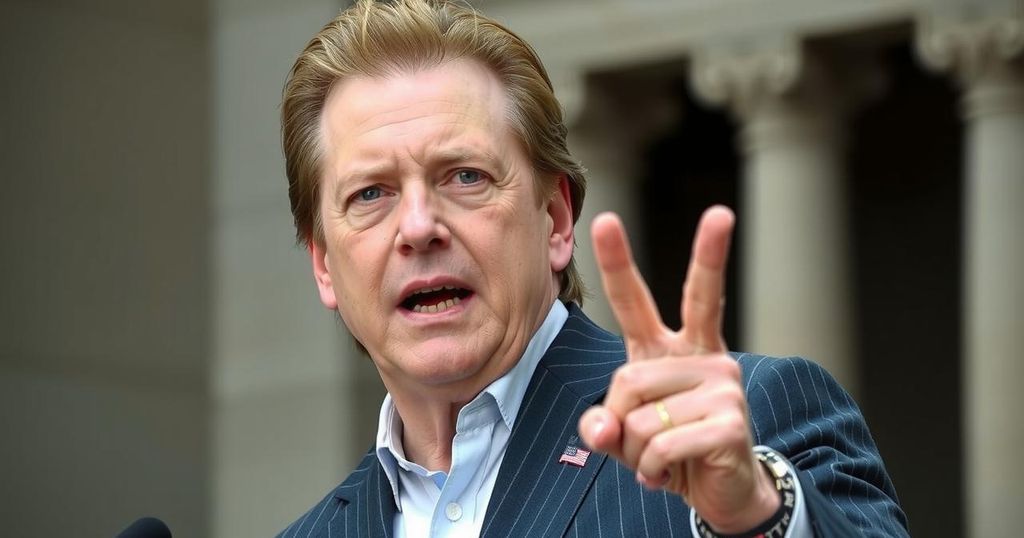Elon Musk Under Fire for Allegedly Interfering in German Elections

Elon Musk faces criticism from the German government for allegedly attempting to influence the upcoming parliamentary election. His support for the far-right AfD party has generated backlash from political leaders, exacerbating fears of foreign interference in national politics. As the February 23 election approaches, the implications of Musk’s actions on German democracy remain uncertain.
The German government has accused Elon Musk, the CEO of Tesla and X, of attempting to interfere in the nation’s upcoming parliamentary election. His recent endorsement of the far-right Alternative for Germany (AfD) party as “Germany’s last hope” has prompted significant criticism. Government spokesperson Christiane Hoffmann indicated that while Musk is entitled to his opinions, his attempts to influence the election are unwelcome and characterized them as “nonsense.”
As Germany approaches its parliamentary elections on February 23, following the collapse of Chancellor Olaf Scholz’s coalition, the popularity of the AfD has noticeably increased, now polling at 19%. This party is often scrutinized for its far-right ideology and is currently monitored by domestic intelligence due to its alleged extremism. In his opinion piece published in Welt am Sonntag, Musk defended the AfD and its leader, Alice Weidel, questioning accusations of extremism due to her same-sex relationship. This declaration has spurred considerable backlash, resulting in the resignation of the newspaper’s opinion editor.
Political leaders have responded vigorously to Musk’s actions. Lars Klingbeil, co-leader of the Social Democrats (SPD), compared Musk’s interference to that of Russian President Vladimir Putin, asserting that both individuals aim to undermine democracy in Germany. Friedrich Merz, the leader of the CDU/CSU, condemned Musk’s engagement as “intrusive and pretentious,” marking it as an unusual overreach by a foreign individual into Western democratic elections.
Musk’s involvement is indicative of his broader political influence. His previous support for U.S. President Donald Trump and his current role as co-chair of the Department of Governmental Efficiency alongside Vivek Ramaswamy showcase his active engagement in politics. Critics argue that his rhetoric could exacerbate political polarization in Germany. An example includes Musk referring to Scholz as a “fool” and calling for his resignation after a tragic incident in Magdeburg.
As the election date approaches, the presence of influential figures like Musk complicates the political landscape and raises concerns about foreign influence on national political processes. Germany’s mainstream parties have publicly vowed not to cooperate with the AfD, posing a challenge to maintaining a balanced democratic debate. Ultimately, whether Musk’s actions will significantly affect voter sentiment or remain a negligible factor will be clarified post-election. This situation presents Germany with a pivotal test of its democratic integrity amidst external pressures and heightened political discourse.
Elon Musk’s recent commentary regarding the German political landscape has sparked widespread discussion regarding foreign influence on national elections. With Germany’s parliamentary elections scheduled for February 23, Musk’s endorsement of the far-right AfD party highlights the intersecting dynamics of business, free speech, and politics. The AfD has been under scrutiny for its far-right ideology, amplifying the implications of Musk’s endorsement during this critical political juncture. His actions have elicited responses from political leaders within Germany, further complicating the public’s perception of his influence within the political sphere.
Elon Musk’s endorsement of the AfD in Germany has ignited a controversy surrounding electoral interference by foreign figures. While he argues for free speech, his actions have raised essential questions about the influence of wealthy individuals on democracy. With the elections approaching, there is concern regarding how his statements may sway public opinion and complicate Germany’s political environment. The outcome of the February elections will determine the lasting impact of these events on the political fabric of Germany and the role of external influences therein.
Original Source: bravenewcoin.com





